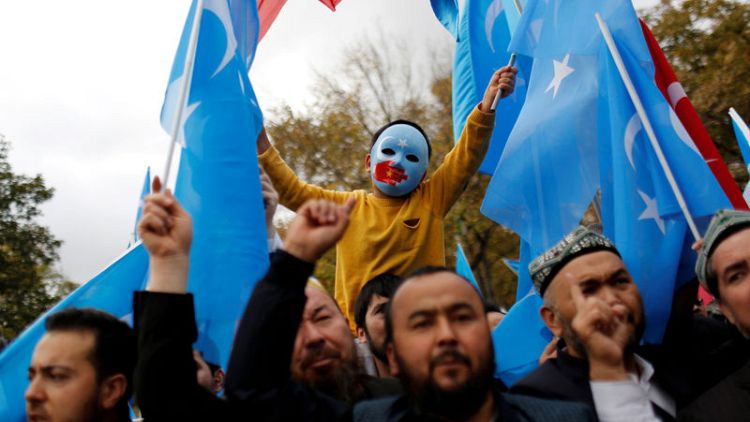By Tom Miles
GENEVA (Reuters) - China said on Thursday its treatment of ethnic Muslims in "happy" and "secure" Xinjiang region was a model for other nations to follow despite a bombardment of Western criticism.
Nearly two dozen nations at the U.N. Human Rights Council this week urged China to halt persecution of ethnic Uighurs in Xinjiang, where U.N. experts and activists say at least 1 million are held in detention centres.
Chinese diplomat Jiang Duan told the council on Thursday a few hypocritical Western nations were distorting facts to smear Beijing over what it describes as vocational training centres in Xinjiang intended to combat extremism and provide new skills.
"Actually the experience in Xinjiang in this field can be introduced to other countries," Jiang added, saying the centres help reintegrate people indoctrinated by radicalism.
"Now the situation in Xinjiang is stable, and the people are united, and their rights are fully respected ... During the past three years, there has not been a single incident of a terrorist attack, and people in Xinjiang feel much better and much more happy and secure."
Xinjiang, three times the size of France, is a largely desert region in China's northwest.
Hundreds of people have been killed there in the past few years in violence between Uighurs, a mostly Muslim people who speak a Turkic language, and ethnic majority Han Chinese, especially in the heavily Uighur south of Xinjiang.
China has blamed the violence on Islamist extremists and separatists, while Uighur exiles and activists point to frustration at Chinese controls on their culture and religion.
The letter criticising China was signed by the ambassadors of 22 countries, including Australia, Canada, Japan, Britain, France, Germany and Switzerland, but not the United States which quit the U.N. body a year ago.
They urged China to allow international independent experts, including U.N. High Commissioner for Human Rights Michelle Bachelet, proper access to Xinjiang.
Bachelet, a former president of Chile, has pushed China to grant the United Nations access to investigate reports of disappearances and arbitrary detentions, particularly of Muslims in Xinjiang.
China's representative said international organisations and media who visited Xinjiang had found the situation was different from its portrayal in the West, and that officials from countries behind the letter declined an invitation to visit.
He accused Western nations of failing to show concern when Xinjiang suffered terrorist attacks, then making irresponsible assessments after the population's lives had improved.
"Those allegations by a small group of Western countries and NGOs cannot do away with the tremendous achievements that were made against terrorism and radicalisation and cannot change the fact that Xinjiang people are leading a happy life," he said.
(Reporting by Tom Miles; Editing by Andrew Cawthorne)
